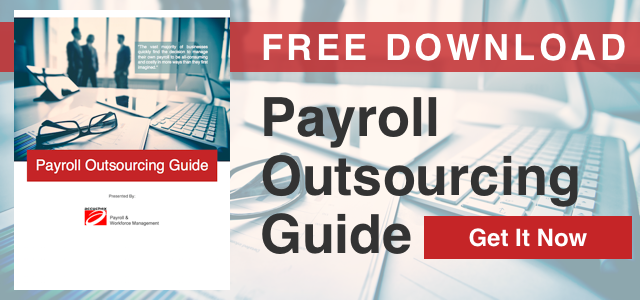The IRS recently indicated that it would begin assessing tax penalties under the Affordable Care Act’s (ACA) employer shared responsibility.

On November 2, 2017, the IRS added a section to its Questions and Answers page titled, “Making an Employer Shared Responsibility Payment,” which includes the first-ever official, detailed guidance regarding how penalties under Internal Revenue Code (IRC) section 4980H will be communicated to employers.
The notifications will be done with Letter 226J. The new section also explains how employers may respond and make payments. These are tax penalties assessed under the Affordable Care Act’s (ACA) employer shared responsibility.
ACA and ALE Background
A key component of the Affordable Care Act (ACA) is the employer shared responsibility mandate. This mandate requires applicable large employers - usually those with 50 or more full-time employees and equivalents, also known as "ALEs” - to offer offer their full-time employees minimum essential health coverage (MEC) that is affordable and provides minimum value. This MEC must be provided to 95% of their full-time employees.
According to the provisions of the ACA, if an ALE does not offer appropriate coverage to an eligible employee, and one or more of their eligible employees receives a premium tax credit from the ACA Health Insurance Marketplace, then that ALE may be subject to an employer shared responsibility payment.
However, according to the Equifax Insight blog,
To date, no penalties have been assessed, yet the ACA and its employer shared responsibility provisions have been in effect since tax year 2015. Further – before the recent guidance was published to the IRS website – no formal assessment, response, and collection process existed.
However, the updated section from the IRS indicates that they may begin assessing employer shared responsibility payments before the end of 2017.
Unfortunately, the penalties non-compliance with the employer shared responsibility mandate are costly. Under IRC Section 4980H(a), an ALE with less than 30 full-time employees that fails to offer coverage as mandated could be assessed a penalty equal to $166.67 (for 2014) per worker per month if any full-time employee obtains coverage on the Marketplace and receives a premium credit.
Tax years after 2014 will be indexed for inflation.
The IRS Letter 226J Compliance Notification
This is the letter to be sent to companies with 50 or more full-time or full-time equivalent employees (Applicable Large Employers or ALEs) that were not in compliance with the ACA for the tax reporting year. The IRS has also released a sample of the letter, which you can go to here.
The letter is over seven pages long and includes the following sections:
- A an explanation of IRC section 4980H.
- Information on the individual employees who, for at least one month in the year, were full-time employees, were allowed a premium tax credit, and for whom the ALE did not qualify for an affordability safe harbor or other relief, as per instructions for Forms 1094-C and 1095-C, Line 16.
- The indicator codes for the ALE that are reported on lines 14 and 16 of each assessable FTE's Form 1095-C
- An Employer Shared Responsibility Payment (ESRP) summary table that itemizes the proposed payment by month and indicates which month has a liability under section 4980H(a) or section 4980H(b)
In addition, the letter sent will include the following:
- An ESRP Response form, Form 14764
- Form 14765, “Employee Premium Tax Credit (PTC) List”, which is a statement that lists, by month, the ALE’s assessable full-time employees.
- A description of IRS actions they will take if the ALE does not respond in a timely manner to Letter 226J
Recommended Employer Response to a Letter 226J
HR and tax experts have offered advice to employers that may be unfortunate enough to receive one of these letters from the IRS.
After receiving Letter 226J, an employer can respond prior to the IRS's official assessment of liability and demand for payment. The letter provides instructions on how an employer should respond to either acknowledge the employer shared responsibility payment, or to dispute liability for the payment.
The Equifax Insight blog also notes that,
Depending on how an employer replies to Letter 226J, the IRS will respond with a corresponding version of Letter 227 that will provide further instructions on how to proceed. At this stage, if an employer still disagrees with the payment, the employer will be able to request a pre-assessment conference with the IRS Office of Appeals to protest. Requests for conferences are due by the response date noted on Letter 227, again 30 days from the date of the letter.
If, as an ALE, you agree with the proposed ESRP you can complete, sign, and date the enclosed Form 14764, (ESRP Response form) and return it to the IRS by the response date. If you do not pay the entire agreed-upon ESRP, you will receive a "Notice and Demand" notification for the balance due.
In addition, according to the ACA Times, any ALEs who receive a Letter 226J need to be prepared to do the following:
Provide information to the IRS by the response date shown in the letter, which will be 30 days from the date the letter was issued. The letter will contain the name and contact information of a specific IRS employee that the ALE should contact if the ALE has questions about the letter.Respond in writing, either agreeing with the proposed employer shared responsibility payment or disagreeing with part or all of the proposed penalty assessment. The letter will provide instructions on how the ALE should respond.
Request a pre-assessment conference, if the ALE disagrees with the proposed or revised ESRP payment. Following this conference with the IRS, the ALE may also ask the IRS Office of Appeals to review the case.
Keep in mind that any ALE that receives a Letter 226J only has 30 days from the date of the letter to respond. Failure to do so can result in a significant IRS penalty assessment and a possible IRS audit.
It's been suggested that since the transition relief period during the 2015 plan year exempted employers with less than 100 full-time employees from the penalty in Code Section 4980H(a), and reduced the penalty threshold to 70% for larger employers, it is quite likely that assessments for 2017 will primarily be based on the smaller, individualized penalty contained in Code Section 4980(b).
Workforce Management and HR Compliance
One of the most important roles of any HR manager is that of being up to date on changes. Staying informed and current on regulatory and legislative changes that influence a business, is essential.
The Accuchex HR Support Center, also referred to as MY HR SUPPORT CENTER, offers employers the most up-to-date and professional human resource management solutions available. Read more here to see what our HR Support Center includes.
Lastly, regarding your payroll needs, it is important to note that outsourcing payroll to a professional payroll management company is increasingly becoming a cost-effective and strategic option. We would love to talk to you when you consider outsourcing your payroll and other workforce management functions.
This free download: Payroll Outsourcing Guide can help you to make informed decisions in the future. Or, if you have questions right now, please call Accuchex at 877-422-2824.




